
Bordalo II – Portuguese street artist famous for his large-scale animals made from urban trash (www.lusolobo.com/bordalo)

Bordalo II – Portuguese street artist famous for his large-scale animals made from urban trash (www.lusolobo.com/bordalo)
A beacon of hope for the preservation of coral reefs
An amazing piece of tapestry by Algarve textile artist Vanessa Barragão has been donated by the Portuguese government to the United Nations, which will display it permanently on the wall of the Delegates Lounge at its headquarters in New York.

The four-by-two meters artwork, entitled Coral Vivo (Living Coral), aims to be a beacon of hope for the preservation of corals. It took two months to create, using only recycled materials such as wool and lyocell.
Despite her 31 years of age, Vanessa Barragão has already exhibited her art around the world, from the USA to Shanghai and from Australia to Japan. She admitted that being invited by the government to donate this piece to the UN stands out as one of her most impressive achievements.

It’s no surprise that the oceans – and corals specifically – are such a strong inspiration for her. She was born in Albufeira, where she spent her childhood at the beaches of the Algarve and used to travel with her parents to coral reefs in the Caribes. When she turned 18, she left home to study Fashion Design at the University of Lisbon. During that time she became more conscious about consumption and sustainability.
After her study she moved up north, where she worked as a textile designer at an artisanal carpet factory in Póvoa de Varzim. It was during this period that she became aware of the amount of waste generated by mass production and the extreme pollution in the textile industry.

In 2020 she decided to move back to the Algarve where she opened her own studio and combined her ecological awareness with techniques based on ancestral textile practices like crochet, weaving, embroidery and macrame. All the materials used come from waste and leftovers from Portuguese factories.

‘Just as the delicate yet resisting threads in this tapestry, all life on the planet is intermeshed in an intricate and co-dependent network. Coral reefs are among the most stunning habitats with the greatest biodiversity on our planet but are extremely threatened,’ Secretary-General António Guterres stated, when the tapestry was officially donated to the UN on the 18th of March in New York.

Coral reefs are not only stunning, they also matter. Although covering less than 1% of the ocean about 25% of all marine species are found around them. Due to the global heating crisis, ocean record temperatures have caused corals to bleach in the three tropical basins of the Atlantic, Pacific and Indian Ocean.
Australia’s Great Barrier Reef – the planet’s biggest coral reef covering an area a little larger than the size of Italy – is experiencing its most widespread bleaching on record. ‘It is a graveyard out there’ according to professor Terry Hughes, a renowned veteran coral scientist.
Enjoy your week Aproveite a sua semana (pic Ptres/Sapo)
Lisbon and Funchal in EU top 10 for polluting cruise ships
World Travel Awards named Lisbon as Europe’s Leading Cruise Port 2022.
Last year well over 200 cruises (with 45,275 passengers) departed at the port of Lisbon.
These vessels are emitting more sulfur oxides (SOx) than one billion cars.

According to a recent study by the European Federation of Transport and Environment focussing on European ports and released by the Portuguese environmentalist association ZERO, atmospheric pollution and greenhouse gasses from cruise ships increased substantially last year compared to pre-pandemic levels; sulfur oxide (SOx) emissions by 9%, nitrogen oxides (NOx) by 18% and fine particles by 25%.
These pollutants are responsible for cardiovascular and respiratory diseases and contribute to the acidification of the ocean. Worldwide, maritime transport is responsible for around 3% of global greenhouse emissions, 250,000 premature deaths, and 6.4 million cases of childhood asthma per year.

In the ranking of European polluters by cruise ships, the study puts Lisbon in 5th place after Barcelona (Spain), Civitavecchia (Italy), Piraeus (Greece), and Palma de Mallorca (Spain). The port of Funchal – the capital of the Portuguese isle of Madeira – rose 5 positions in the ranking (from 15th to 10th), which was justified by the considerable increase (25%) in cruise ship calls.

In 2019, the port of Venice won the unfortunate title of the most polluted cruise port in Europe. In 2022 it plummeted to the 41st position after banning large cruise ships from entering the port. The measure resulted in an 80% reduction in SOx emissions.
Zero draws attention to the ‘false solutions’ by cruise ship operators that do not represent viable measures and aggravate the ecological footprint. In the first place, the widespread use of exhaust gas cleaning systems (scrubbers), promotes the emission of fine particles by 60% when used with heavy fuel.

Furthermore, wastewater discharges redistribute pollutants in the ocean. There is also a record of the wrong bet on liquefied fossil gas (LNG) as an alternative fuel, which hides the fact that LNG is more harmful to the environment than heavy fuels because of methane leaks, says the organization.
It would be far better to create conditions for cruise ships to connect to the electricity grid in Lisbon and Funchal and create laws to oblige them to do so! Not only will the environment gain but also the Portuguese economy through the electricity sold to these – mostly foreign – ships.
Enjoy your week Approveite a semana (pic Público/Sapo)
‘Plastic poisons our bodies and pollutes the environment.’
Plastic contaminates the entire planet from the summit of Mount Everest to the deepest oceans – where plastic litter from takeaway food and drink dominate – and microplastics have been found in people’s blood, organs, and breastmilk and have crossed the placenta. Plastic production has soared some 30-fold since it became widespread in the 1960s.

Global plastic pollution could be slashed by 80% by 2040, according to a report from the UN Environment Programme (UNEP). The first step is to eliminate unnecessary plastic, such as excessive packaging. The next steps are to increase the reuse of plastics – such as refillable bottles – booster recycling and replace plastics with greener alternatives.
Such a shift would mean plastic pollution would drop from the current production of 450 million tons a year to about 40 million tons in 2040, reducing the damage to health, the climate, and the environment.

Europeans produce – on average – 35 kg of plastic packaging waste per year. Packaging is responsible for 40% of all plastic in the EU and plastic packing waste is expected to increase.
The European Commission indicates that the 10 single-use plastic articles most often found on European beaches represent 70% of all marine litter. Reuse systems could reduce plastic pollution by 30% by 2040.

Portugal is well below the European average with plastic waste recycling and most of the plastic ends up out of sight. Buried, burned or exported – in particular to Spain, where most plastic waste went last year.
Greenpeace warns that recycling plastic can make it more toxic – as breaking down plastics scatters microplastics and toxic chemicals in the environment – and should not be considered a solution to the plastic crisis.

‘Simply put, plastic poisons the circular economy and our bodies and pollutes air, water, and food, says Therese Karlsson, a science adviser with the International Pollutants Elimination Network (IPEN). Real solutions to the crisis will require global control of over 3000 potentially harmful chemicals in plastics and a significant reduction in plastic production.
Representatives of 175 countries recently met at the UN headquarters in Paris for a second stage of negotiations to come to an agreement to end plastic pollution in the world. Just over a year ago, in Kenya, a principle of agreement was reached with the ambition to develop – by the end of 2024 – a legally binding treaty under the aegis of the UN.

The main objective will be to reduce the production of new plastics and ban disposable plastics as soon as possible. If successful, it could join the rescue of the ozone layer as a landmark success in environmental diplomacy.
Enjoy the week Boa semana (pic Público/Sapo)
Environmental noise is linked to depression, anxiety, and heart disease
According to WHO, ambient noise is, after air pollution, the second biggest environmental cause of health problems. Prolonged exposure to noise provokes sleep disturbance, stress, headache, and concentration problems – eventually leading to chronic conditions such as depression, anxiety, and heart disease.

Last month the Government announced a temporary annulment of restrictions on night air traffic between 00.00 and 06.00, requested by the country’s air traffic control company between the 18th of October and 29th of November, in order to implement its new Top Sky control system. This means an extra 425 night flights in six weeks.
Environmental associations ZERO, Quercus and Geota strongly oppose this exceptional move and consider it illegitimate to sacrifice the population of Lisbon and Loures – approximately 150.000 citizens – with intolerable noise levels – of more than 65 decibels – at night.

The environmentalists state that not only is the current regime of night-time restrictions disrespected -with already 50% more night-time flights than legally established – but also that noise thresholds in the vicinity of the airport are constantly exceeded, making Lisbon’s Humberto Delgado one of the worst European airports to noise from air traffic.
Moreover, people living close to the airport are exposed to high concentrations of ultrafine nanoparticles giving rise to pulmonary problems in adults and cognitive problems in children.

For many years already, residents of downtown neighborhoods in Lisbon (i.e. Bairro Alto, Cais de Sodré, and Santos) are complaining about excessive noise in bars and on the streets.

A stricter policy from the municipality is warranted based on experiences from other European cities – such as Barcelona – where fines of up to 600 euros are given for anyone caught drinking alcohol on the streets. In the meantime, the City Council has created a noise hotline (Linha Ruido 808 910 555) to denounce rowdy gatherings, with calls going straight to the police.

Light pollution is a worldwide problem associated with a harmful impact on health (sleep disturbance) and ecosystems (migration of birds, disappearance of insects and bats). With regard to this, the tiny island of Corvo in the Azores will turn off the public lighting system at night to protect its endangered seabirds.

Portugal scores the worst in Europe regarding light pollution, both in terms of luminous flux per capita and per gross domestic product (GDP). In fact, the country uses on average four times more light than Germany or Switzerland!
But not only are we using more light, the transition to blue-white light emitted with the introduction of energy-efficient LED lamps, will further increase its negative impact on the environment.
Enjoy the week Boa semana (pic Público/Sapo)
‘Bottled water is a shame’
Portuguese are champions in the consumption of bottled water with 140 liters per person per year. That is 14 times more than the Swedes, 5 times more than the Dutch, and 3 times more than the British. Bottled water is not only very expensive, but plastic bottles also mean a huge burden on the environment.

Tap water in Portugal is safe, just like in most EU countries. According to Science Alert ‘water from the tap or water from the bottle are virtually identical for most people as far as their health is concerned. The bottled water industry, however, is driven by health concerns regarding drinking water.
Bottled water costs on average 300 times more than tap water. The first documented case of bottled water being sold was at a time public water was not safe to drink. It was in Boston USA in the 1760s when a company called Jackson Spa sold mineral water for therapeutic use.

The bottling and selling of water are one of the most lucrative ideas in retail marketing. The bottled water industry has worldwide an increasing market of over $20 billion per year and the rate at which it expands is around 10% per year.
More than half of the time these companies are using local ‘tap’ water, filtering it with standard techniques, and selling it at inflated prices. They are making billions of profits, whereas you can get the product out of your tap virtually for free.

Plastic bottles are made from by-products of crude oil.
Unlike other plastic materials that are reused over time – in Europe circa 30% of plastic is recycled – plastic bottles are typically used once and then disposed of.
Add this to the cost of transporting vast quantities of bottled water around the country, if not across Europe, and you will understand that we are not only contributing to global warming but also being deliberately wasteful.

Over 13 million tons of plastic – a truckload every minute – are annually dumped in our oceans and plastic makes up 85% of marine litter and waste found on our beaches.

The plastic soup in the meantime has reached a size equivalent to 17 times the surface of Portugal and microplastics are not only killing fish but also invading our bodies through the food chain.
Nevertheless, the production of plastic is still on the increase.
Enjoy the week Boa semana (pic Púlico/Sapo)
Climate change in Portugal varies from wildfires to storms

Although the world’s C02 emissions are expected to fall by 8% this year – as the coronavirus pandemic shuts down much of the global economy.- the reduced emissions are very unlikely to have a serious impact on the global levels of carbon dioxide.
The target laid out in the Paris agreement would require at least similar reductions every year in the decades to come.

Climate change in Portugal varies from wildfires to storms. On September 13 the country suffered the largest forest fire of the year whilst only one week later sub-cyclone Alpha ravaged the central districts of Leiria and Coimbra.
Global warming is going to bring more tropical cyclones moving north and eastward from the Atlantic ocean.

Three years ago strong winds and heat from passing hurricane Ophelia fanned more than 150 wildfires, claiming the lives of at least 45 citizens. And last year the Azores were hit by Lorenzo, the strongest hurricane ever recorded in the Central North Atlantic, with winds blowing at 260 km/hour.

Although the pandemic decreases air pollution and waste production – the last mainly as a result of the collapsing tourism industry –these changes are most likely temporarily, as the rapid rebound in air pollution and coal consumption to pre-Covid levels across China shows.

Moreover, the increase of plastic disposables during the pandemic– like masks, gloves, gowns, face shields and take-away packages – poses a serious threat to the environment, in particular to the oceans. Every year 230,000 tons of plastic are dumped into the Mediterranean. Various environmental NGO’s, therefore, argue not to use disposable but reusable masks by those who don’t belong to a risk group.

Besides the damage done by the pandemic to the environment, long-term exposure to atmospheric pollution –already linked to heart/lung damage and premature death – may have increased Portugal’s risk of death from Covid by 11%, putting new emphasis on why the disease appears to be most prevalent in metropolitan areas.
Keep distance Stay healthy (pic público/sapo)
We have to stop moving because this virus can’t move on its own.
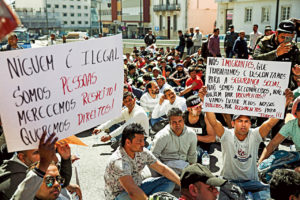 All migrants, including asylum seekers with pending applications at immigration (Serviço de Estrangeiros e Fronteiras), will be treated as permanent residents until at least July 1, granting them full access to the National Health Service, welfare benefits, bank accounts, work, and rental contracts during the corona outbreak.
All migrants, including asylum seekers with pending applications at immigration (Serviço de Estrangeiros e Fronteiras), will be treated as permanent residents until at least July 1, granting them full access to the National Health Service, welfare benefits, bank accounts, work, and rental contracts during the corona outbreak.
The Council of Ministers explained that the decision was taken ‘to reduce the risks for public health’ when maintaining the current scheduling of appointments at the immigration office, both for the border agents and the migrants and asylum seekers.
 The European Commissioner for Home Affairs praised the humane approach of the left-wing government and encouraged other European countries to follow Portugal’s example.
The European Commissioner for Home Affairs praised the humane approach of the left-wing government and encouraged other European countries to follow Portugal’s example.
Last year 135,000 immigrants obtained residency. Brazilians and Ukrainians make up the majority, followed by west Africans, British and French.
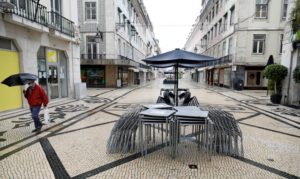 Portugal declared the State of Emergency on March 19 and recently extended it to April 17 with tough penalties for anyone breaking quarantine.
Portugal declared the State of Emergency on March 19 and recently extended it to April 17 with tough penalties for anyone breaking quarantine.
Suspension of non-essential services happened when only 6 had died from the virus. In Italy, this did not happen before over 1,000 people had died.
 Schools in Portugal even closed before any deaths were registered.
Schools in Portugal even closed before any deaths were registered.
In Spain, this happened after 84 people had died. In Italy, it took 366 and in the UK 233 deaths before schools closed.
 Portugal is doing comparatively well so far. But the authorities’ advice to stay at home and keep distance has to be maintained to prevent further suffering. Researchers at the Imperial College in London suggested that without these measures deaths in Portugal could reach 70,000.
Portugal is doing comparatively well so far. But the authorities’ advice to stay at home and keep distance has to be maintained to prevent further suffering. Researchers at the Imperial College in London suggested that without these measures deaths in Portugal could reach 70,000.
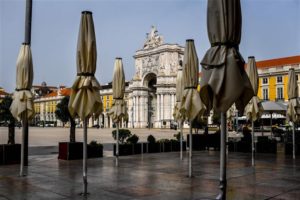 With the peak of the virus predicted in May, it is becoming increasingly clear that quarantine measures in Portugal probably have to stay in force till the end of June.
With the peak of the virus predicted in May, it is becoming increasingly clear that quarantine measures in Portugal probably have to stay in force till the end of June.
All efforts will be wasted if social distancing measures are ended too rapidly.
 To finish off with a quote of the famous Dutch footballer Johan Cruijff ‘ every disadvantage has its advantage.’
To finish off with a quote of the famous Dutch footballer Johan Cruijff ‘ every disadvantage has its advantage.’
The confinement of people at home and the consequent reduction in traffic circulation and economic activities has resulted in 80% less air pollution in Lisbon, a finding also registered in other major European cities.
Stay healthy Fique saudável (pic Reuters/Público)
For decades a suitable location for a second runway has been studied to take the pressure off Lisbon’s congested inner-city airport.
Ota, Alcochete, Alverca and Beja have been considered over the years and subsequently rejected.
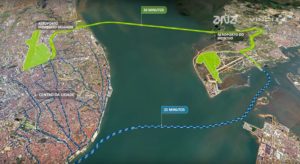 The Socialist Government of Antonio Costa is convinced that upgrading Montijo Air Force Base 6 on the south bank of Lisbon’s Tagus estuary, is the best option.
The Socialist Government of Antonio Costa is convinced that upgrading Montijo Air Force Base 6 on the south bank of Lisbon’s Tagus estuary, is the best option.
Much against the advice of engineers, climate scientists, conservationists and civic groups.
Left-wing parties – generally supporting the government – are also against it. ‘Choosing Montijo mainly satisfies the French company VINCI which purchased Portugal’s airport at a bargain price and now wants to make as much money as possible’, stated Left Bloc coordinator Catarina Martins.
 In addition, the national airline TAP refuses to fly there. ‘Montijo is for companies that fly from A to B’, in other words ‘ low-cost operators’, according to TAP, that focuses on transcontinental passengers using Lisbon as a hub.
In addition, the national airline TAP refuses to fly there. ‘Montijo is for companies that fly from A to B’, in other words ‘ low-cost operators’, according to TAP, that focuses on transcontinental passengers using Lisbon as a hub.
Ryanair and EasyJet are equally uninspired as they mainly carry ‘short stay’ passengers, for whom a trip into the capital from an outlying airport is ‘a waste of time.’
A further complication is, that other major companies like British Airways, Lufthansa and Emirates can’t use Montijo because the runway is 600 metres too short, increasing the probability of an accident
 Moreover, at least 30.000 citizens in the Netherlands have signed a petition objecting to the ‘ecologically disastrous plan.’ It concerns the survival of Netherlands national bird – the black-tailed godwit – that returning from its winter migration from Africa to the Netherlands feeds and rests in the wetland area beside the airport site. It is estimated that between January and February around 50.000 godwits use the area.
Moreover, at least 30.000 citizens in the Netherlands have signed a petition objecting to the ‘ecologically disastrous plan.’ It concerns the survival of Netherlands national bird – the black-tailed godwit – that returning from its winter migration from Africa to the Netherlands feeds and rests in the wetland area beside the airport site. It is estimated that between January and February around 50.000 godwits use the area.
 Researchers also say birds are at risk of colliding with aircraft and will be driven away by the noise. The reaction of Secretary of State Alberto Souto de Miranda was stunning ‘people should not worry because birds are not stupid and will probably adept.’
Researchers also say birds are at risk of colliding with aircraft and will be driven away by the noise. The reaction of Secretary of State Alberto Souto de Miranda was stunning ‘people should not worry because birds are not stupid and will probably adept.’
 The latest obstacle in starting construction on a 1.3 billion euro project are two Communist-led councils (Moita and Seixal) in the vicinity, which – by law – have the power to veto the plan. Even if it is supported by the government and given green light by licensing authorities. Attempts of the PS Government to persuade the largest opposition party – the centre-right PSD – to change the law accordingly, proved to be in vain.
The latest obstacle in starting construction on a 1.3 billion euro project are two Communist-led councils (Moita and Seixal) in the vicinity, which – by law – have the power to veto the plan. Even if it is supported by the government and given green light by licensing authorities. Attempts of the PS Government to persuade the largest opposition party – the centre-right PSD – to change the law accordingly, proved to be in vain.
A recent court’s ruling in the UK against the expansion of Heathrow airport – because of the British government not adequately taking into account the goals of the Paris Climate Agreement – might jeopardize prime minister Costa’s plans at a global level, since with the new airport CO2 emissions will increase 700.000 tons per year.
Enjoy your day Aproveite o dia (pic Público, PtRes, Sapo)
Contrary to what was hoped for, global CO2 emissions actually increased in 2018.
 Every major city in Europe is warmer in the 21st century than it was in the 20th. In December 2015, 195 member states of the UN agreed in the Paris Agreement to limit the temperature increase to 1.5⁰C above preindustrial levels. For several cities on the Iberian Peninsula, this 1.5⁰C threshold has already been reached.
Every major city in Europe is warmer in the 21st century than it was in the 20th. In December 2015, 195 member states of the UN agreed in the Paris Agreement to limit the temperature increase to 1.5⁰C above preindustrial levels. For several cities on the Iberian Peninsula, this 1.5⁰C threshold has already been reached.
In Lisbon – situated on the Atlantic Coast – the average temperature increased 0.5⁰C and the number of hot days (24-hour average temperature above 24⁰C) nearly doubled since 2000.
 Even limited temperature increases have severe consequences. A hotter atmosphere can absorb more water leading to severe floods between longer and dryer periods. Heatwaves lead to excess mortality and mosquito-borne diseases like dengue fever has been creeping North with epidemics in Portugal in 2012. Recent research shows that when the daily temperature increases above 22⁰C, cognitive abilities of schoolchildren decrease.
Even limited temperature increases have severe consequences. A hotter atmosphere can absorb more water leading to severe floods between longer and dryer periods. Heatwaves lead to excess mortality and mosquito-borne diseases like dengue fever has been creeping North with epidemics in Portugal in 2012. Recent research shows that when the daily temperature increases above 22⁰C, cognitive abilities of schoolchildren decrease.
The expectations are that the Mediterranean will heat up more than the global mean, resulting in a substantial decrease in the production of hydroelectric energy of which Portugal is more dependent than the Northern European countries.
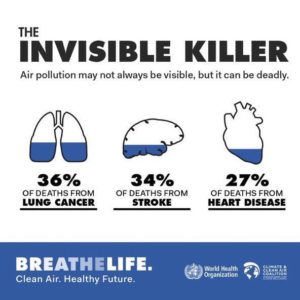 Although Portugal had in 2018 the highest reduction in CO2 emissions of all EU member states, CO2 emissions of its national airline TAP skyrocketed in the last 2 years. This was mainly the result of an explosive 30% increase in the number of passengers.
Although Portugal had in 2018 the highest reduction in CO2 emissions of all EU member states, CO2 emissions of its national airline TAP skyrocketed in the last 2 years. This was mainly the result of an explosive 30% increase in the number of passengers.
Booming tourism has become the main money-spinner generating annually more than € 14 billion in government revenues but the downside is pollution.
Portela airport – with more than 650 flight movements per day – knows few restrictions for night flights with planes coming in just a hundred meters above rooftops.
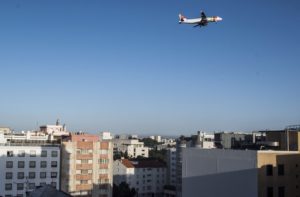 Ultrathin particles are 20 times higher close to the airport than elsewhere in the city. Measurements of inner-city noise levels taken by the environmental group ZERO showed noise pollution for more than 400.000 people with levels above the legal limits of more than 16 dB at night and 10 dB during daytime.
Ultrathin particles are 20 times higher close to the airport than elsewhere in the city. Measurements of inner-city noise levels taken by the environmental group ZERO showed noise pollution for more than 400.000 people with levels above the legal limits of more than 16 dB at night and 10 dB during daytime.
About 300 giant cruise ships – with at least 600.000 passengers to embark – are every year docking at a brand-new (€ 50 million) terminal. Even though only 2 years old there is no portside electricity for the moored vessels.
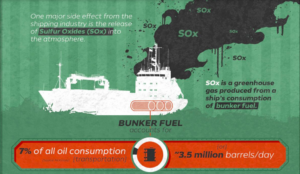 Massive amounts of particulate matter and sulphur dioxide (SO2) have made Lisbon’s port the sixth most polluting in Europe.
Massive amounts of particulate matter and sulphur dioxide (SO2) have made Lisbon’s port the sixth most polluting in Europe.
SO2 emissions from those ships are 85% higher than those emitted by Portugal’s entire car traffic over a year.
Climate change can only be achieved by keeping hydrocarbons in the ground and capturing carbon from the atmosphere. Neither option has produced any result so far.
 In order to prevent global warming catastrophe policymakers have to get serious about a carbon tax set high enough to price oil, coal and gas out of the market says William Nordhaus, one of the winners of last year’s Nobel Prize for economics.
In order to prevent global warming catastrophe policymakers have to get serious about a carbon tax set high enough to price oil, coal and gas out of the market says William Nordhaus, one of the winners of last year’s Nobel Prize for economics.
Bom fim de semana Enjoy your weekend (pic Público/Observador)
